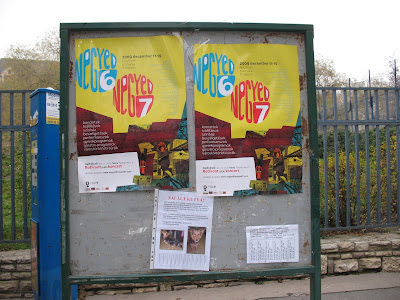Posters for last year's Quarter6Quarter7 Hanukkah festival in Budapest. Photo (c) Ruth Ellen Gruber
A number of Jewish culture festivals of all sorts take place around Europe in the spring and summer (and beyond). Some are dedicated just to music. Some to film. Others are much broader. As far as I know, there is no central web site where you can find information on all of them. I will begin to post information here on dates and venues. I ask my readers to please send me information to include!
The culture festivals and other smaller events make good destinations around which to center a trip. Some, like the annual Festival of Jewish Culture in Krakow, are huge events lasting a week or more, which draw thousands of people and offer scores or sometimes hundreds of performances, lectures, concerts, exhibits and the like. Other festivals are much less ambitious. Some are primarily workshops but also feature concerts. Many of the same artists perform at more than one festival.
The list will be growing and growing -- and again, I ask my readers to please send me information and links to upcoming events. Thanks!
ALL OVER EUROPE -- 11th annual European Day of Jewish Culture. The first Sunday in September -- Sept. 5. Events take place in nearly 30 countries. The theme this year is Art and Judaism.
AUSTRIA
April 22-27 -- Vienna -- Stay Jewish! (Film Festival)
October 14-November 14 -- Vienna -- Yiddish Culture Autumn (web site under construction)
November 6 - 21 -- Vienna -- KlezMORE festival (this year's program is not up yet)
CROATIA
Aug. 23-31 -- Opatija -- Bejahad 2010
CZECH REPUBLIC
July 8-11 -- Boskovice -- Boskovice Festival. Mainly jazz, but also an emphasis on Jewish culture, given the importance of the well-preserved former Jewish quarter, cemetery and Jewish museum in the restored synagogue.
July 29-31 -- Trebic -- Seventh edition of the Trebic Jewish Culture Festival, held in the Czech Republic's most extensive preserved former Jewish quarter
FRANCE
April 9 - July 18 -- Paris -- Radical Jewish Culture exhibit (and concerts), Jewish Museum
June 13-28 -- Paris -- 6th Festival of Jewish Cultures
July 5-9 -- Paris -- Klezmer Paris festival Lots of workshops from an all-star international team of musicians and teachers.
November 6-13 -- Lyons -- International Jewish Music Festival
Nov.21-Dec. 13 -- Paris -- Jazz'n'Klezmer festival, 9th edition.
GERMANY
March 5-14 -- Fürth -- Fürth International Klezmer Festival (12th edition)
July 3-August 2 -- Weimar -- Yiddish Summer Weimar
October 17-31 -- Dresden -- The 14th Yiddish Weeks Dresden
November 20-30 -- Munich -- The 24th Jewish Culture Days, Munich (devoted this year to Jewish Berlin)
HUNGARY
April 2-4 -- Budapest -- Mini-Israeli-Film-Festival, Kino cinema club
August 5-8 -- Bank Lake -- Bankito Festival
August 26-Sept. 6 -- Budapest -- Jewish Summer Festival
ITALY
March 11 -- Barletta -- Festival Musica Judaica 2009-2010
April 17-21 -- Ferrara -- Festival of the Jewish Book in Italy
April 23-May 23; Sept. 26-Oct. 31 -- Casale Monferrato -- OyOyOy Festival
October 9-13 -- Rome -- International Festival of Jewish Literature
October 23-27 -- Rome -- Kolno'a Israeli Film Festival
NETHERLANDS
April 18-25 -- Leeuwarden -- Yiddish Festival Leeuwarden (takes place every other year)
Oct. 28-31 -- Amsterdam -- International Jewish Music Festival
POLAND
April 9-11 -- Warsaw -- Festival of New Jewish Music
April 20-25 -- Warsaw -- Jewish Motifs International Film Festival
May 23-28 -- Wroclaw -- 12th Simcha Jewish Culture Festival (note -- other events take place May 5-9, with the gala re-opening of the newly restored White Stork Synagogue)
May 15-23 -- Warsaw -- "Otwardatwarda" festival
May 23-26 -- Warsaw -- 13th Jewish Book Fair
June 13-19 -- Sejny -- Musicians' Raft
June -14-16 -- Bialystok -- Zahor Festival of Jewish Culture
June 19-20 -- Chmielnik -- The Eighth "Meetings with Jewish Culture" festival
June 22-26 -- Piotrkow Trybunalski -- Days of Judaism
June 26-July 4 --Krakow -- Festival of Jewish Culture --20th Edition!
July 13-17 -- Kazimierz Dolny -- Klezmer Music Festival
July 23-25 -- Poznan -- 4th Tzadik Jewish Culture Festival
August 11 -- Lublin -- Shalom. Meetings with Jewish Culture
August 12-14 -- Rymanow -- Shabbat in Rymanow
August 28-Sept. 5 -- Warsaw -- Singer's Warsaw Jewish Culture Festival
October 4-6 -- Slupsk -- Meetings with Jewish Culture
ROMANIA
May 24-27 -- Timisoara -- Jewish Culture Days
May 26-29 -- Bucharest -- Czech Nine Gates Festival
June 19-22 -- Sighet -- Sighet Jewish Festival
September 2-5 -- Bucharest -- World of Yiddish Festival
RUSSIA
March 29-April 4 -- Moscow -- Yiddish Fest
SWITZERLAND
March 6-April 25 -- Geneva - Printemps Sefarade
U.K.
Feb. 27-March 7 -- London -- Jewish Book Week
June 21-24 -- London -- Cantors Convention
August 8-13 -- London -- KlezFest
Ukraine
July 25 -- L'viv -- LvivKlezFest
October 3-10 -- Kharkov -- Days of Jewish Culture


